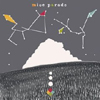Mice Parade
 Unfussily and without gimmicks, Adam Pierce (as Mice Parade) favors certain notes and chords that quickly build excitement, sadness, and nostalgia. I don't think of this as cheap, easy, commercial or anything less than art. To dismiss it as pop would be a mistake.This disc is an evolved version of his flowing, blissful, non-clichéd popular music.
Unfussily and without gimmicks, Adam Pierce (as Mice Parade) favors certain notes and chords that quickly build excitement, sadness, and nostalgia. I don't think of this as cheap, easy, commercial or anything less than art. To dismiss it as pop would be a mistake.This disc is an evolved version of his flowing, blissful, non-clichéd popular music.
I recently saw Adam Pierce making a one-song sit-in appearance at a late night Vashti Bunyan gig at the Central Presbyterian Church in Austin. Without my glasses it was hard to see whether the blue instrument he was holding was a baritone ukulele or a guitar. Either way, his contribution was virtually undetectable. If he played a note it went under my radar, though in the circumstances such restraint was well-judged. Bunyan was magnificent, her voice an unadorned wonder. A deep beauty shines out of her; she speaks in little more than a warm whisper, reacting to applause as kindly and gently as if we were her offspring bringing her our latest crayon doodle. Except for the darker and brilliant "I’d Like to Walk Around in Your Mind" her songs are sad, luminous, quiet pieces of artistry which lack nothing. The man who is Mice Parade knows better than to gild the lily.
A couple of years ago I either realized or read someone else say that Mice Parade will probably never make a masterpiece. We shall see, but certainly, wisely, it seems that there is merely a flow and Adam Pierce is going with it; in that sense like the Incredible String Band and Gastr del Sol.
The 4 minute opener "Sneaky Red" could be the bastard son of George Formby and MBV, propelled by a dynamic electric guitar crunch and the tilt-a-whirl strings of it's nylon counterpart. Pierce's voice has never sounded better or sadder. That is, until the deceptive "Tales of Las Negras" which follows. Driven by slippery drumming, a blissful European sensibilty and a gentle descending hum, eventually the track features the cool warbling of Stereolab's Laetitia Sadler against the rising sparkle of Pierce's plucking. Not a moment wasted.
The handclaps and subtle highlife-influenced guitar of "The Last Ten Homes" give it enough contrast to balance the slightly less satisfying vocals. "Snow" bursts in with more of the polite yet contrasting crunch. What follows is either a peak or an annoyance, depending upon mood or point of view. Kristin Anna Valysdottir's singing may cross the fey line for some people or make "Double Dolphins on the Nickel" a classic. Either way, it's worth hearing and the clever pulsing guitar notes are an undeniable foil.
"Swing" clears the air with swirling strokes after the muddier and crowded "Satchelaise." The latter has a relaxed feel of a live workout that didn't ignite, seeming instead to stagnate. "Circle None" begins with a hypnotic quasi-African guitar figure before bleeding into the kind of portentous, ebbing, instrumental piece that brilliantly seems to be arriving and leaving at the same time. Currently perfect for ad agencies and NPR producers, neither of which is Pierce's fault or his intention, I imagine. The piece subtly reprises earlier sections of the record, as does the chiming, choppy, spiralling finale "The Nights After Fiction."
The music is affecting because it consists of sounds which Pierce believes in and which he finds affecting. They are as carefully chosen as his contribution to the Bunyan show. Given his idiosyncratic caution this record shows a definite willingness to expand the palate of sound. That is surely the way forward.
samples:



